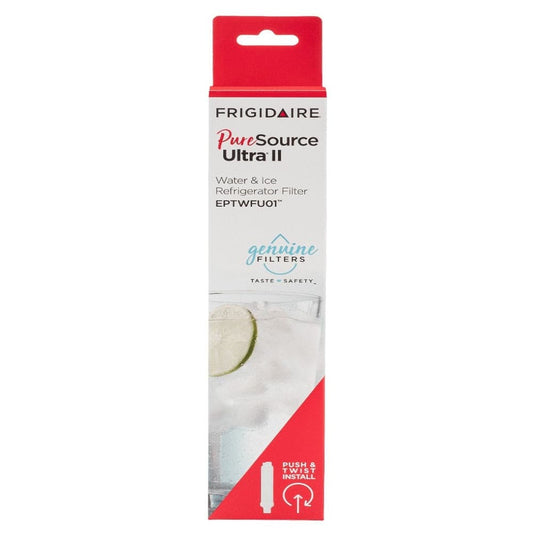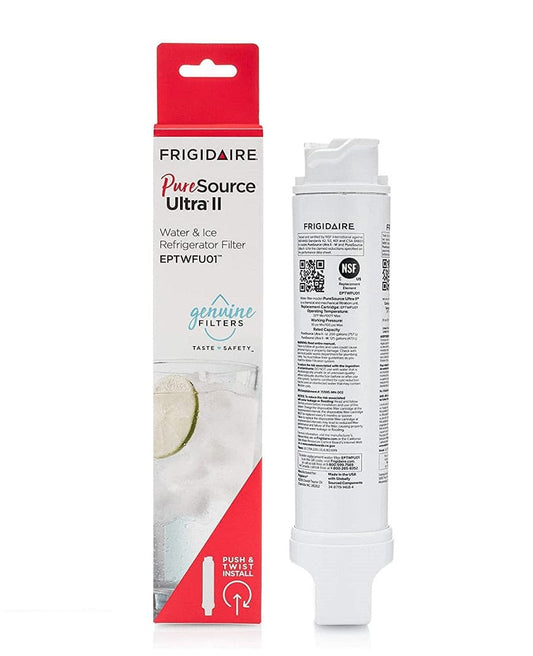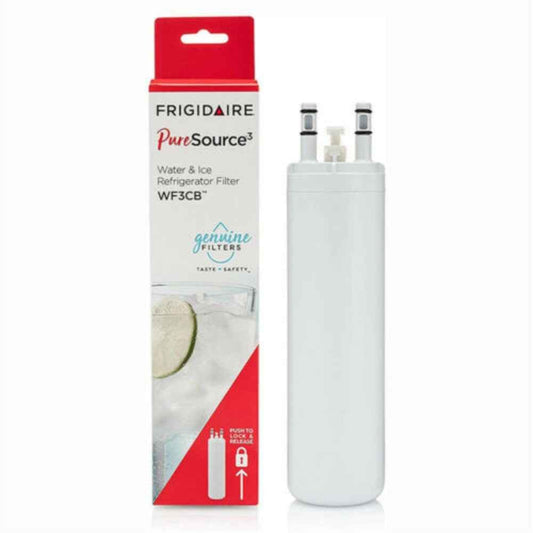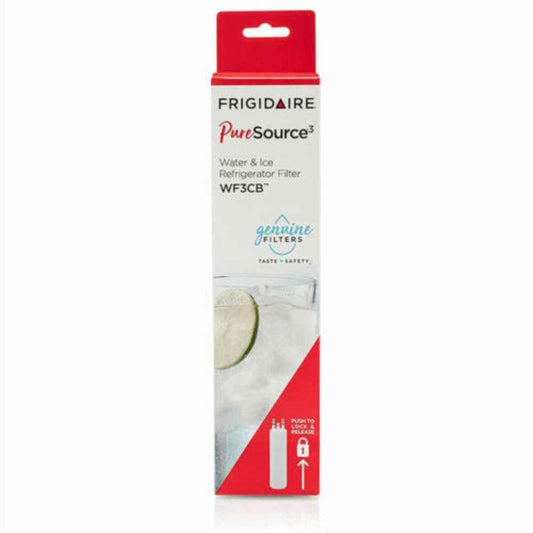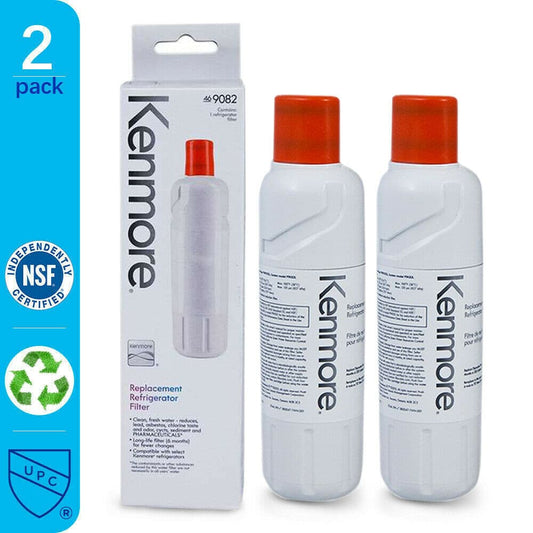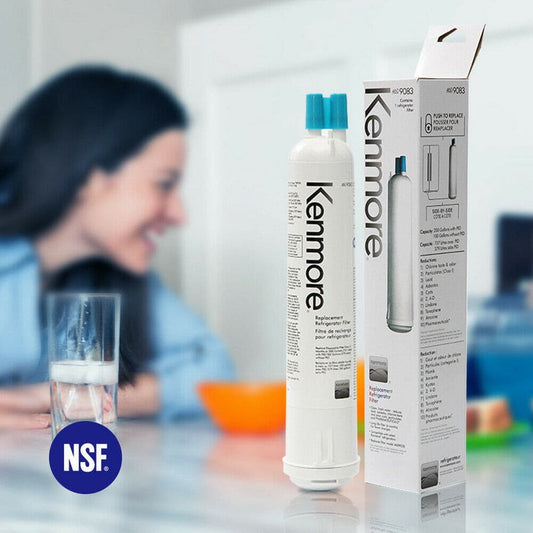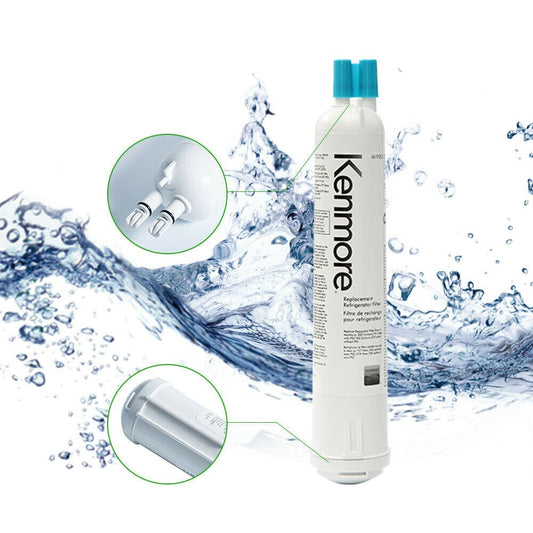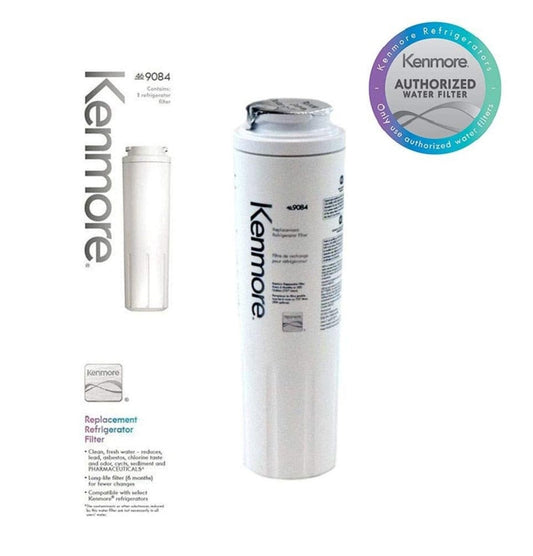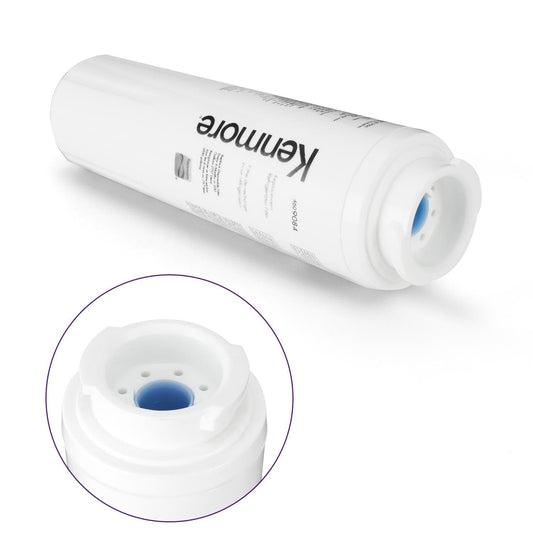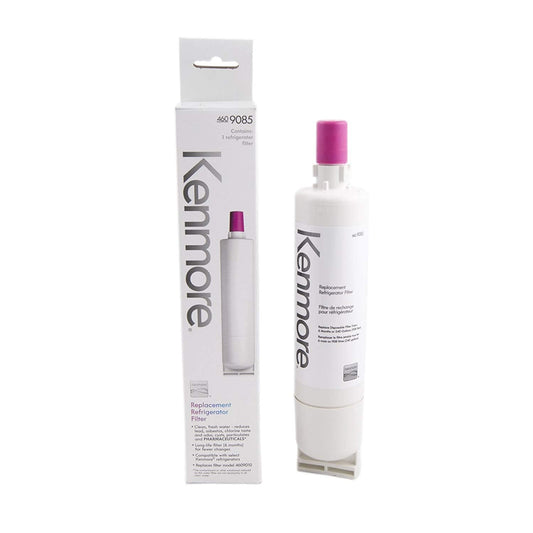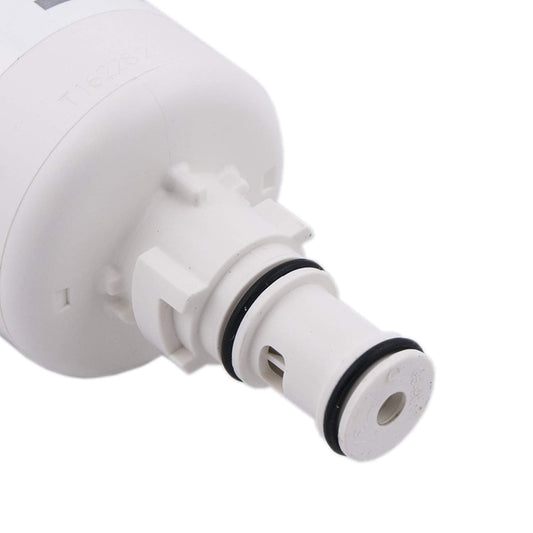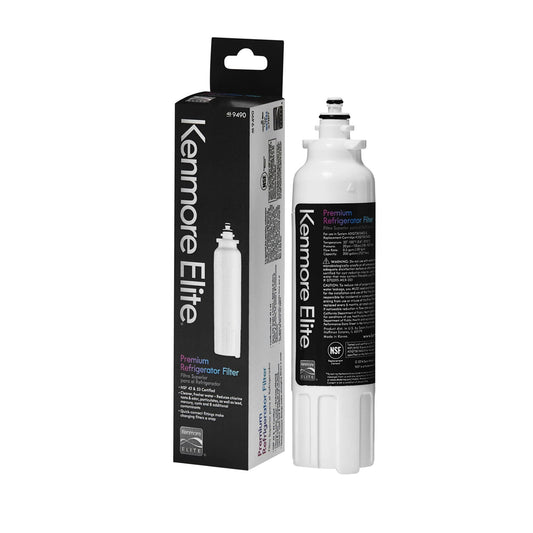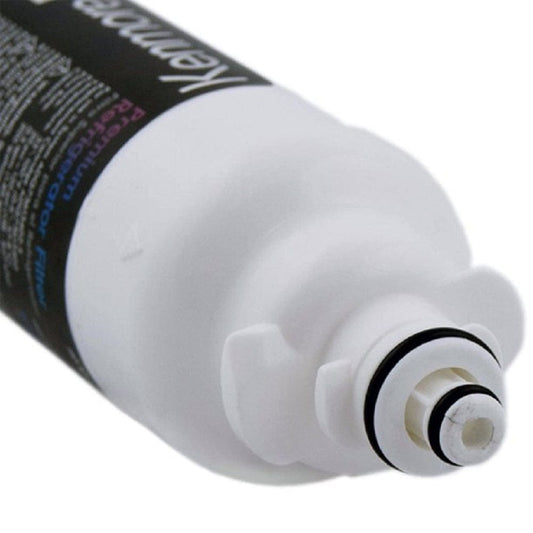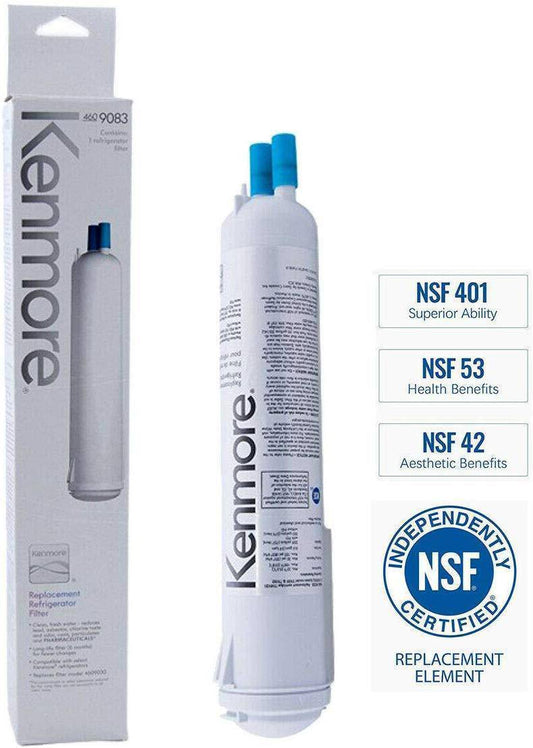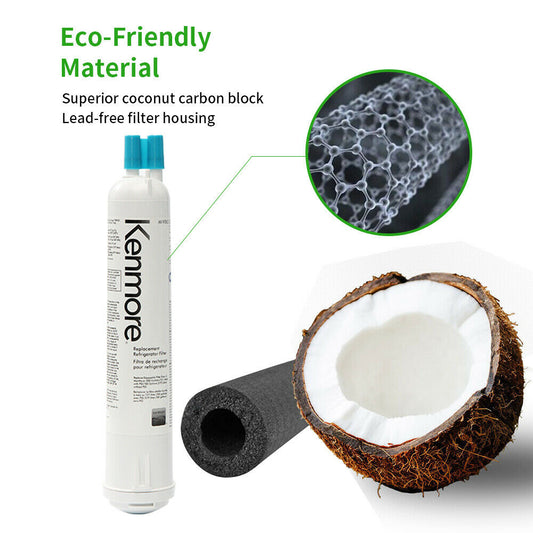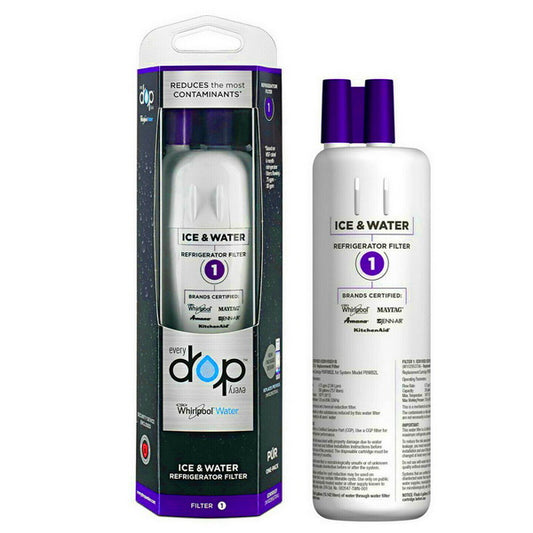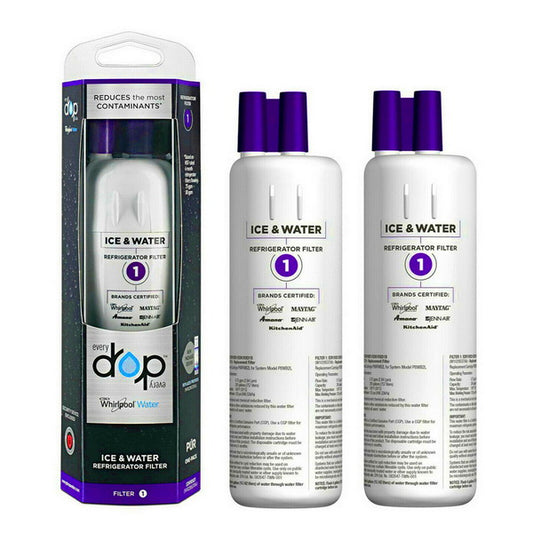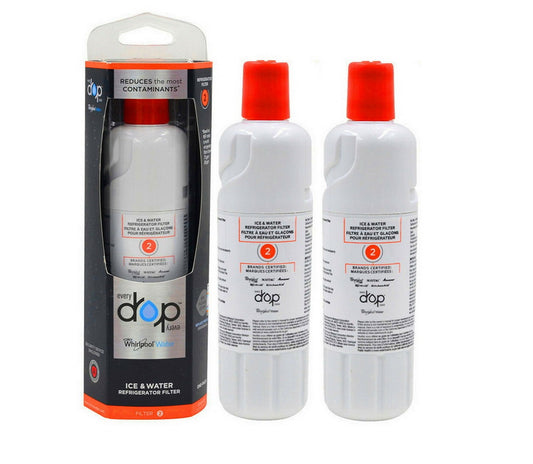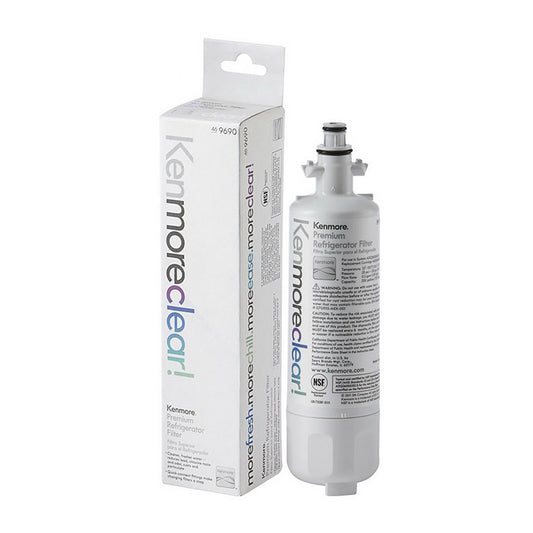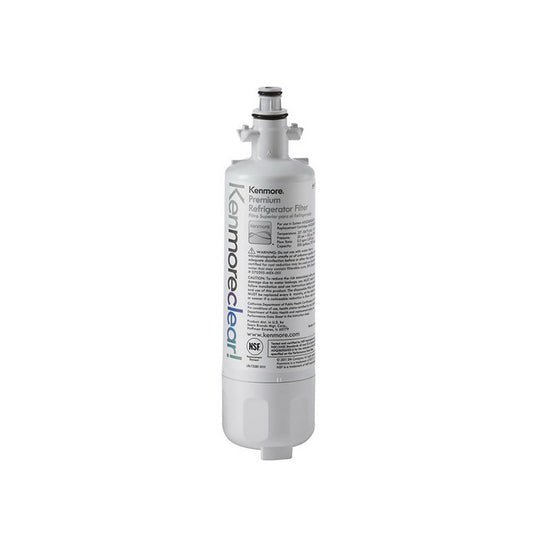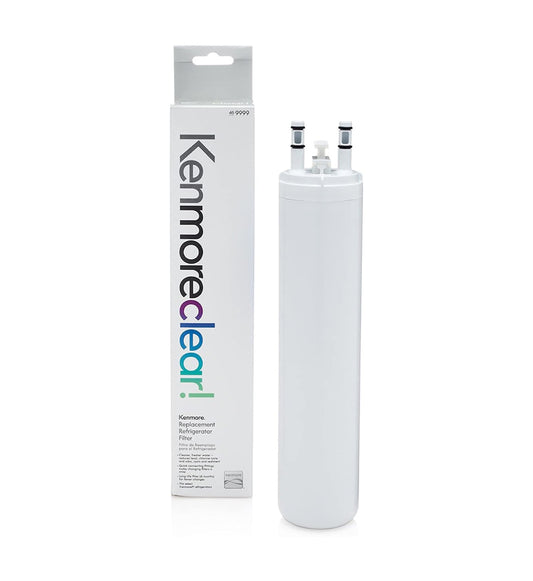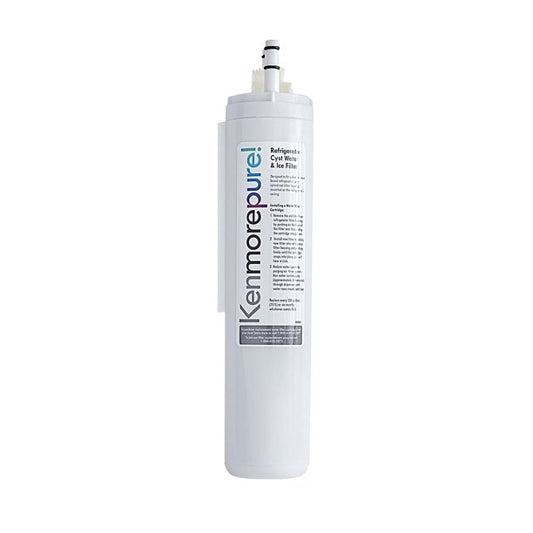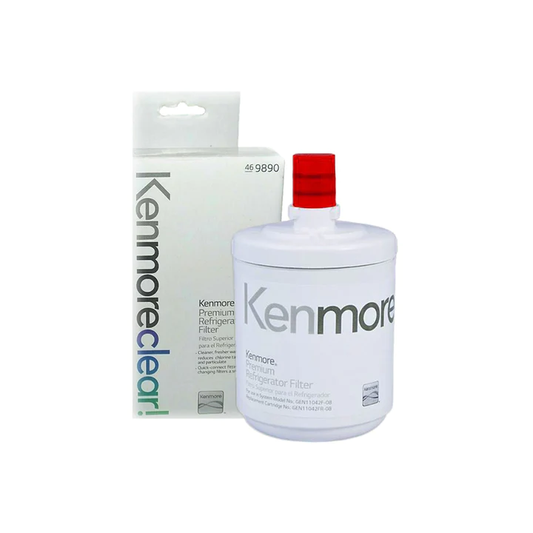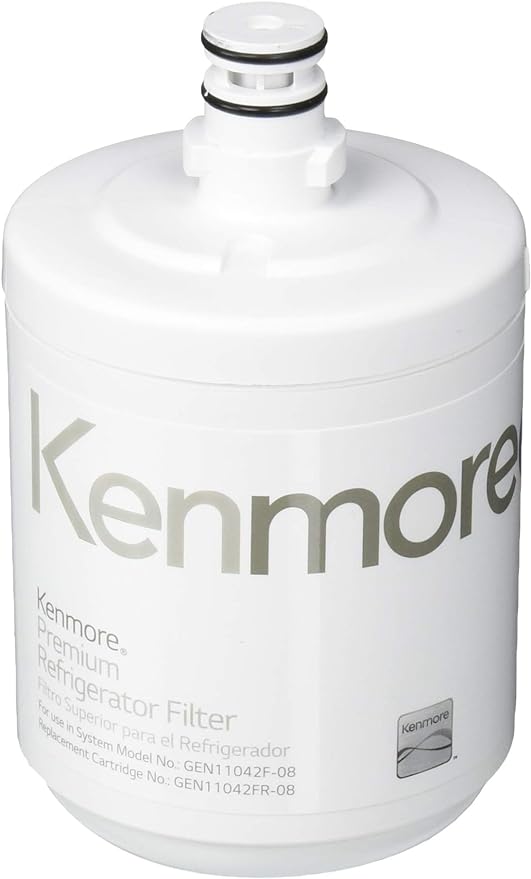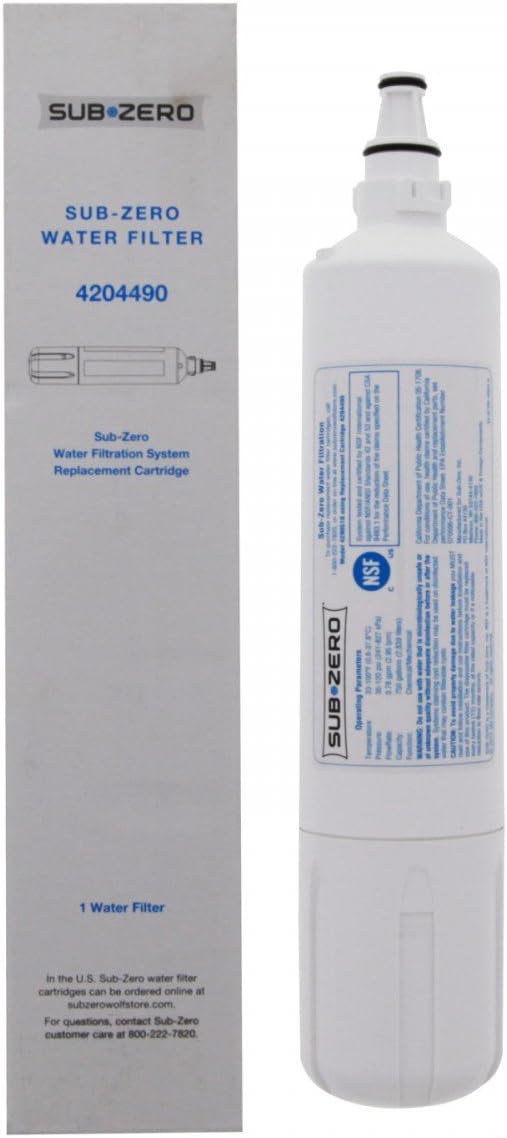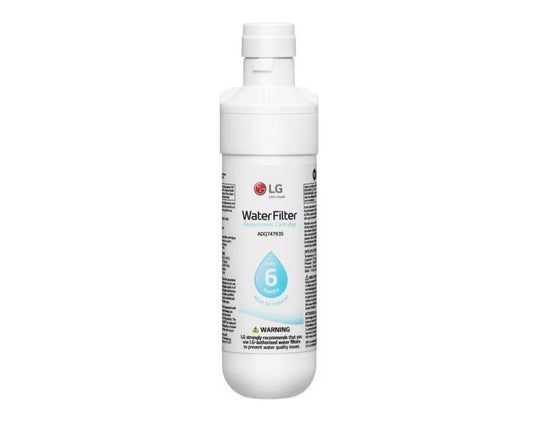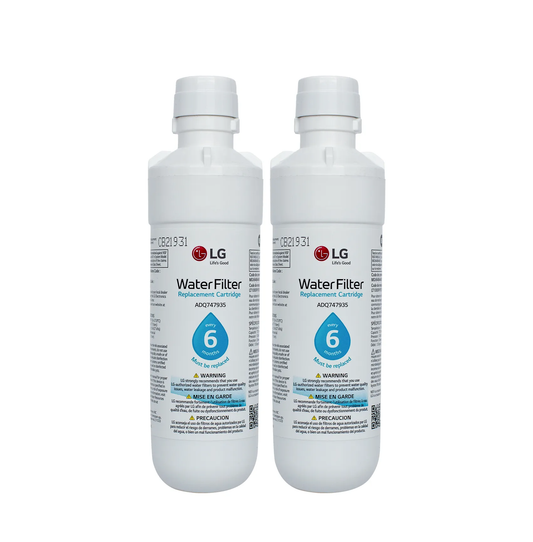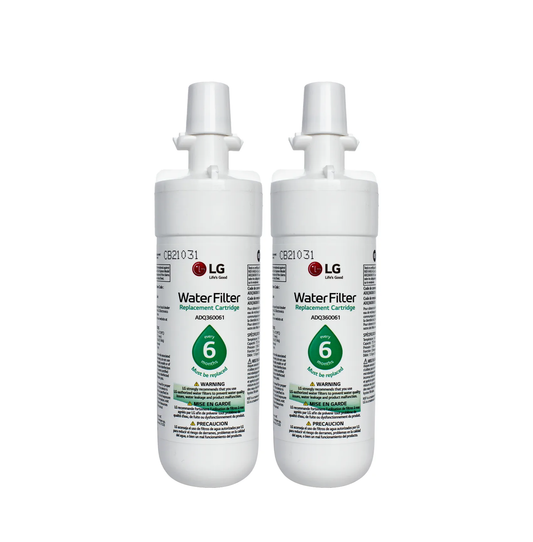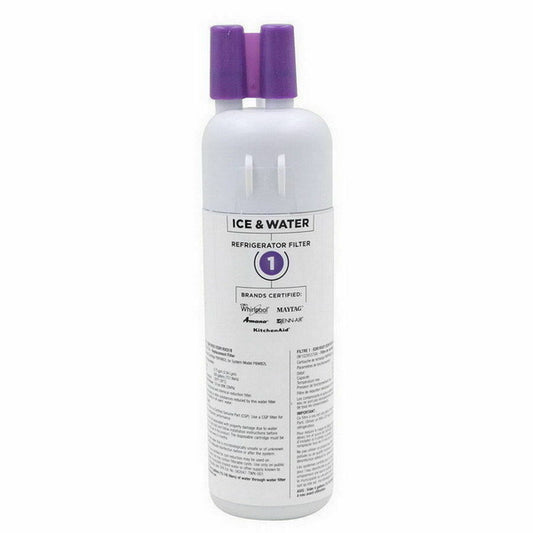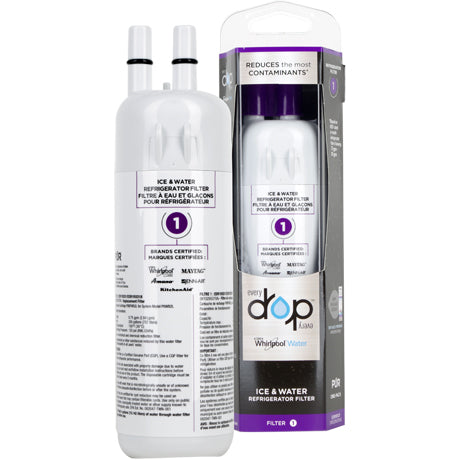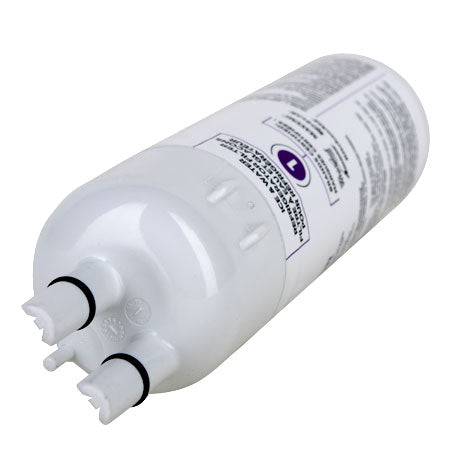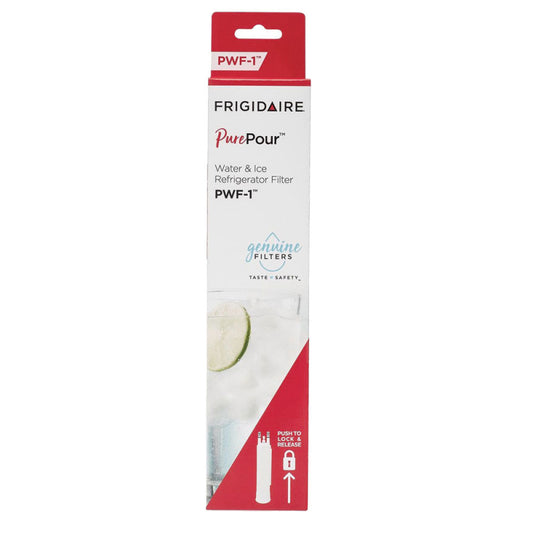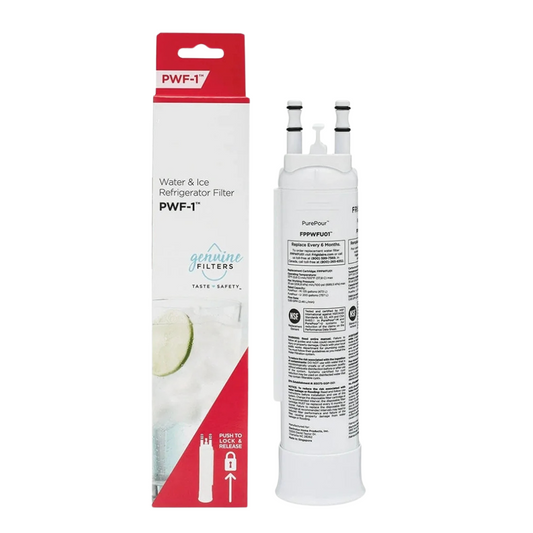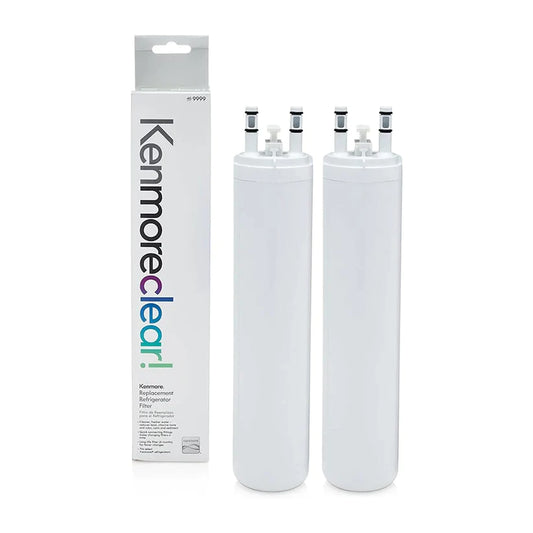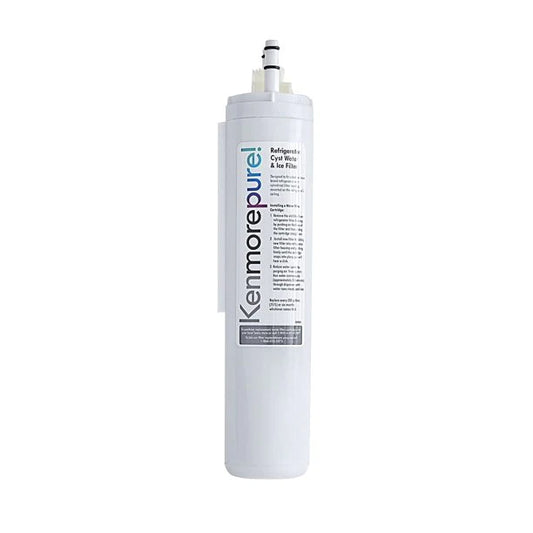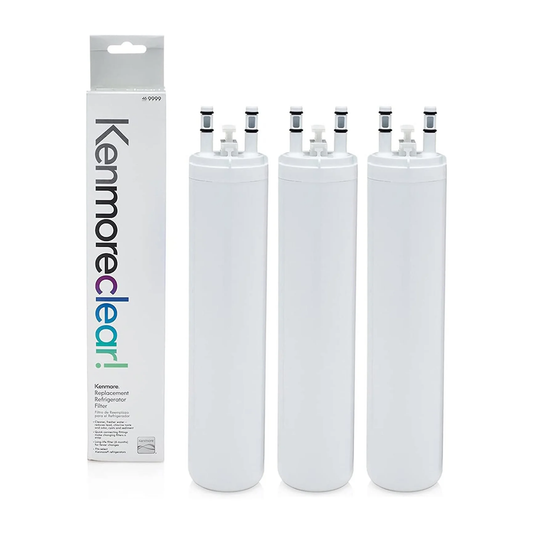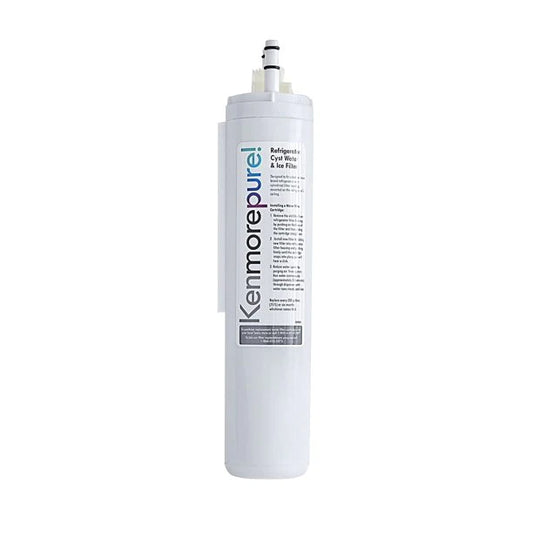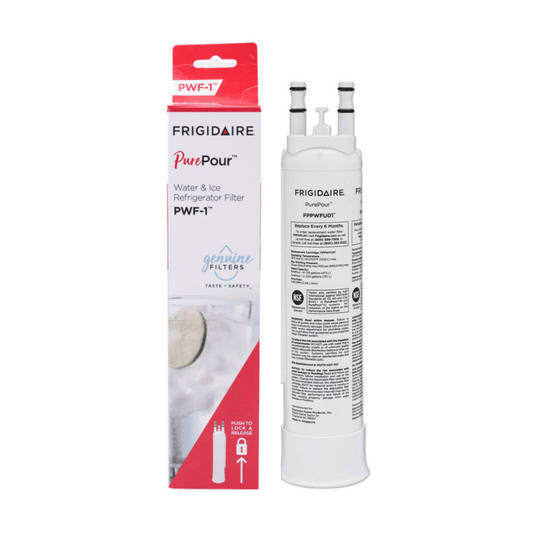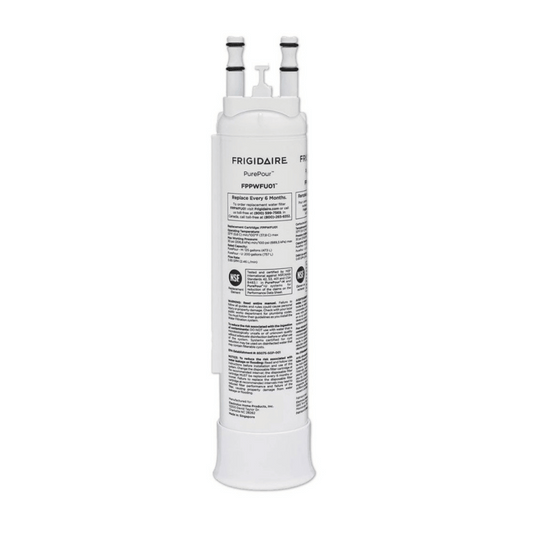Buy Replacement Refrigerator Water Filters
-
Frigidaire EPTWFU01 Compatible Water Filtration Filter
Vendor:Frigidaire1 reviewRegular price From $33.99 USDRegular price -
WF3CB Frigidaire Puresource 3 Water Filter
Vendor:FrigidaireRegular price From $33.99 USDRegular price$37.99 USDSale price From $33.99 USDSale -
Kenmore 9082 Replacement Refrigerator Ice & Water Filter
Vendor:KenmoreRegular price From $18.99 USDRegular price -
Kenmore Refrigerator Water Filter 9083 Replacement Cartridge
Vendor:KenmoreRegular price From $17.99 USDRegular price -
Kenmore 9084 Refrigerator Ice & Water Replacement Filter
Vendor:Kenmore1 reviewRegular price From $19.99 USDRegular price -
Kenmore 9085 Water Filter
Vendor:KenmoreNo reviewsRegular price From $22.99 USDRegular price -
Kenmore ADQ73613402 Water Filter 9490
Vendor:Kenmore1 reviewRegular price From $19.79 USDRegular price -
Kenmore 9083, 46-9083, 9030/9020 Replacement Refrigerator Water Filter, 2 Pack
Vendor:Kenmore1 reviewRegular price $35.98 USDRegular price -
3 Pack Kenmore 9083 Refrigerator Water Filter
Vendor:KenmoreNo reviewsRegular price $53.97 USDRegular price -
Whirlpool Refrigerator P8WB2L Replacement Water Filter
Vendor:Everydrop4 reviewsRegular price From $36.99 USDRegular price -
Replacement Whirlpool P9WB2L Ice and Water Filter
Vendor:Everydrop2 reviewsRegular price From $36.99 USDRegular price -
Kenmore 9690 Refrigerator Water Filter | Compatible for kenmore 46-9690,469690
Vendor:KenmoreNo reviewsRegular price From $19.99 USDRegular price -
Kenmore 9999 Water Filter (OEM)
Vendor:Kenmore1 reviewRegular price From $21.99 USDRegular price -
Kenmore 9890 ADQ72910902 Refrigerator Water Filter
Vendor:Kenmore1 reviewRegular price From $29.99 USDRegular price -
SUB-ZERO WATER FILTER 4204490
Vendor:Sub-ZeroNo reviewsRegular price From $45.99 USDRegular price$66.28 USDSale price From $45.99 USDSale -
LG LT1000P PC/PCs Replacement Refrigerator Water Filter Cartridge
Vendor:LG1 reviewRegular price From $36.99 USDRegular price -
LG ADQ747935 Refrigerator Water Filter
Vendor:LG1 reviewRegular price From $36.99 USDRegular price -
LG LT700P Refrigerator Water Filter ADQ36006101
Vendor:LGNo reviewsRegular price From $36.99 USDRegular price -
Replacement Water Filter for Whirlpool Refrigerator Models WRS321SDHZ, WRS321SDHZ01, and WRS321SDHZ08
Vendor:Everydrop5 reviewsRegular price From $36.99 USDRegular price -
Replacement Whirlpool Refrigerator WRS325FDAM01, WRS325FDAM02 and WRS325FDAM04 Water Filter
Vendor:Everydrop3 reviewsRegular price From $36.99 USDRegular price -
Frigidaire FPPWFU01 Water Filter PurePour PWF-1 Replacement Filter
Vendor:Frigidaire3 reviewsRegular price From $37.99 USDRegular price -
Kenmore 9999 469999 Refrigerator Water Filter, Compatible with ULTRAWF White(2 Pack)
Vendor:Kenmore2 reviewsRegular price $38.99 USDRegular price -
Kenmore 9999 - 46-9999, 469999, Replacement Refrigerator Water Filter (Pack of 3)
Vendor:Kenmore1 reviewRegular price $52.98 USDRegular price -
Replacement Filter for FRSS2623AS and FRSS2623ASD Frigidaire Refrigerator
Vendor:Frigidaire4 reviewsRegular price From $37.99 USDRegular price
Refrigerator Water Filters
Imagine this: you're super thirsty after a busy day, dying for a cool sip of water from your fridge, but it tastes weird. Sound familiar? Well, fear not! We're here to talk about fridge filters—the secret superheroes of your refrigerator. Our guide is here to make it easy for you to understand everything about fridge filters. No more yucky water taste, just pure refreshment! Whether you need a new water filter for your fridge or just some replacement cartridges, we've got your back. Let's jump in and learn all about keeping your water clean and delicious!
Why are refrigerator water filters essential for your health and home?
Your refrigerator water filter plays a pivotal role in making sure the quality and safety of the water you and your family consume daily. It serves as a frontline defense against an army of potential contaminants sneaking into your tap water. It offers multiple benefits that go beyond merely improving taste. Here's why refrigerator water filters are indispensable:
- Removal of contaminants: Tap water can hold various impurities, such as chlorine, lead, mercury, pesticides, and microbial cysts, which pose serious health risks if consumed. Refrigerator water filters are made to successfully remove these contaminants, providing you with clean, safe drinking water.
- Enhanced taste and odor reduction: Apart from removing harmful substances, refrigerator water filters also work to flourish the taste and smell of your water. By reducing chlorine and other chemicals that contribute to unpleasant tastes and smells, these filters ensure that every sip is refreshing and enjoyable.
- Protection against waterborne illnesses: Consuming contaminated water can lead to gastrointestinal issues, infections, and other health problems. By reducing bacteria, viruses, and parasites, refrigerator water filters help safeguard your family's health and reduce the risk of waterborne illnesses.
- Preservation of appliance performance: Using a water filter helps protect your refrigerator's water dispensing and ice-making mechanisms from damage caused by mineral buildup and sedimentation. This extends the lifespan of your appliance and ensures optimal performance over time.
Without a good filter, you're basically rolling the dice with every gulp, and who wants to do that? So, when it comes to drinking contaminant-free water and staying healthy, don't underestimate the power of your refrigerator water filter. It's the unsung hero of your kitchen, working quietly in the background to keep you hydrated and happy.
How long do refrigerator water filters last?
Refrigerator water filters typically last for about six months. However, this can vary reclining on factors such as the brand and model of the refrigerator, the quality of the water supply, and the amount of water used.
Some filters may need to be replaced sooner if they become jammed or if the water flow decreases significantly. It's essential to follow the manufacturer's recommendations for replacing the filter to ensure the best performance and water quality.
Many refrigerators, such as Kenmore and Whirlpool, come equipped with indicator lights or alarms that signal when it's time to replace the filter, making it easy to stay on top of maintenance.
Regularly changing your refrigerator water filter is important for keeping clean, safe drinking water and ensuring the proper functioning of your appliance's water and ice dispensers.
What happens if you don't change your water filter on time?
Neglecting to change your refrigerator water filter on time can cause a range of issues, such as-.
- Decreased water quality: Over time, the effectiveness of the filter reduces as it becomes jammed with contaminants. This can result in a decrease in water quality, with impurities such as chlorine, sediment, and other particles making their way into your drinking water.
- Health risks: Drinking water that hasn't been properly filtered can expose you to harmful contaminants, including bacteria, viruses, and heavy metals like lead. Consuming contaminated water causes health risks, especially for individuals with weakened immune systems.
- Potential damage to appliances: An old, jammed water filter can strain your refrigerator's water system, leading to decreased water flow and increased pressure on internal components. This can result in potential damage to the appliance, requiring costly repairs or even replacement.
- Compromised ice quality: If your refrigerator has an ice maker, a neglected water filter can cause damage to the quality and taste of the ice produced. Contaminated water may result in ice cubes with a strange taste or odor, reducing the overall beverage experience.
Understanding Common Contaminants and How Water Filters Can Help?
In drinking water, you might find things that aren't good for you, like germs that can make you sick or chemicals that can be harmful. Some of these things include bacteria and viruses, which can give you stomach problems. There could also be stuff like chlorine, which is used to clean the water but can taste bad, or metals like lead and arsenic, which can be really bad for your health. Sometimes, you might see little pieces of dirt or rust in the water, or there might be chemicals that form when the water is treated. Chemicals from factories and natural stuff like radon can also get into the water. It's important to make sure our water is safe to drink by checking it regularly and cleaning it up if needed.
Water filters can effectively reduce or remove various contaminants from drinking water, including:
- Chlorine and Chloramine: These are chemicals used to clean water, but they can make it taste and smell bad. Water filters, especially ones with activated carbon, can take out chlorine and chloramine, making the water taste better.
- Sediments: Sometimes, there are tiny bits of dirt or rust in the water, which can make it look cloudy and taste weird. Water filters that can catch these sediments can make the water clearer and nicer to drink.
- Heavy Metals: Metals like lead, mercury, and copper can be harmful if they're in the water. Water filters with activated carbon or special media can catch these metals and stop them from getting into the water you drink.
- Microorganisms: Germs like bacteria and viruses can make you sick if they're in the water. Some water filters, like ones with ceramic or carbon block filters, can trap these germs and keep them out of your drinking water.
- Volatile Organic Compounds (VOCs): These are chemicals from things like gasoline or paint that can end up in the water. Water filters with activated carbon can grab these chemicals and make the water safer to drink.
Things To Consider When Looking For Fridge Water Filters
With so many options available on the market for refrigerator water filters, choosing the right filter for your fridge can be overwhelming.
To help you navigate this decision-making process, it's essential to consider several key factors. By understanding what to look for when selecting a fridge water filter, you can make an informed choice that meets your household's water quality needs. Let's explore some important considerations to keep in mind when searching for the perfect fridge water filter.
- Compatibility: Ensure that the filter is fit with your refrigerator model. Check the manufacturer's specifications or consult the refrigerator manual to find the appropriate filter model.
- Certifications: Filters that are certified by reputable organizations such as NSF International or the Water Quality Association (WQA). Certification ensures that the filter meets industry standards for contaminant reduction.
- Filtration Performance: Consider the filtration capabilities of the filter, including its ability to remove specific contaminants such as chlorine, lead, and microbial cysts. Choose a filter that addresses your water quality concerns.
- Lifespan: Check the lifespan of the filter, which is typically measured in gallons of water or months of use. Opt for a filter that lasts long enough to meet your household's water consumption needs.
- Ease of installation: Get a filter that is easy to install and replace. Look for filters with simple twist-and-lock mechanisms or push-in designs for hassle-free installation.
- Indicator lights: Consider filters with indicator lights or alarms that signal when it's time to replace the filter. This feature eliminates guesswork and ensures timely filter replacement for continued water quality.
- Cost: Compare the cost of different filters, including the initial purchase price and ongoing replacement costs. Balance the upfront investment with the long-term value and performance of the filter.
Types of Water Filters and How They Work?
These brands offer a range of water filtration options to suit different preferences and water quality needs, ensuring that you can enjoy clean and great-tasting ice and water straight from your refrigerator. Here's an overview of common types of water filters and how they work, tailored to the mentioned refrigerator brands:
Kenmore: Kenmore refrigerators typically use various types of water filters, including activated carbon filters and reverse osmosis filters.
- Activated carbon filters: These filters contain activated carbon, which traps and removes contaminants like chlorine, sediment, and volatile organic compounds (VOCs) from the water. The carbon has a porous structure that absorbs impurities as water passes through.
- Reverse osmosis filters: Some Kenmore models may feature reverse osmosis filtration systems. These systems use a semi-permeable covering to remove contaminants, including dissolved solids, heavy metals, and microorganisms, by forcing water through the membrane at high pressure.
EveryDrop: EveryDrop filters are known for their compatibility with various refrigerator brands, including Whirlpool, Maytag, KitchenAid, JennAir, and Amana.
- Activated carbon filters: EveryDrop filters typically utilize activated carbon filtration technology to remove contaminants such as chlorine, lead, mercury, and pharmaceuticals. The carbon adsorbs impurities while allowing clean water to pass through.
- Microfiltration: Some EveryDrop filters may also incorporate microfiltration membranes to remove particles and microorganisms from the water, providing an additional layer of purification.
Whirlpool: Whirlpool refrigerators often feature different types of water filters, including activated carbon filters and reverse osmosis systems.
- Activated carbon filters: Similar to other brands, Whirlpool filters use activated carbon to adsorb contaminants, improving water taste and odor by removing chlorine, sediment, and other impurities.
- Reverse osmosis systems: Some Whirlpool models may include built-in reverse osmosis systems, which employ a multi-stage filtration process to remove dissolved solids, chemicals, and microorganisms from the water, producing high-quality drinking water.
Frigidaire: Frigidaire refrigerators may come equipped with various types of water filters, including activated carbon filters and inline filters.
- Activated carbon filters: Frigidaire filters with activated carbon successfully removing chlorine taste and odor, as well as other impurities.
- Inline filters: Inline filters are installed outside the refrigerator, typically in the water supply line. These filters use activated carbon or other filtration media to remove contaminants before water enters the fridge.
What Types of Features Do These Refrigerator Filters Offer?
With various brands offering different types of filters, it's essential to understand the features they provide. Let's explore some standard features offered by refrigerator water filters, tailored to popular brands like Kenmore, EveryDrop, Whirlpool, and Frigidaire:
Kenmore Water Filters
- NSF certification: Kenmore water filters are often NSF certified, confirming that they meet rigorous standards for contaminant reduction. This certification assures quality and performance.
- Longevity indicator: Some Kenmore filters come with longevity indicators or countdown timers, alerting you when it's time to replace the filter. This feature helps ensure that you always have clean, filtered water available.
EveryDrop Water Filters
- Triple filtration technology: EveryDrop filters may utilize triple filtration technology, consisting of activated carbon, ion exchange, and microfiltration layers. This comprehensive filtration process ensures thorough contaminant removal and superior water quality.
- Easy installation: EveryDrop filters are designed for easy installation, typically featuring twist-and-lock mechanisms or push-in designs for hassle-free replacement. This user-friendly feature makes filter maintenance simple and convenient.
Whirlpool Water Filters
- High flow rate: Whirlpool water filters may offer a high flow rate, delivering clean, filtered water quickly and efficiently. This feature ensures that you have access to refreshing water whenever you need it, without waiting for slow filtration.
- Indicator lights: Some Whirlpool filters come with indicator lights that signal when it's time to replace the filter. This helpful feature eliminates guesswork and ensures timely filter replacement for continued water quality.
Frigidaire Water Filters
- PureSource filtration: Frigidaire water filters may feature PureSource filtration technology, which effectively removes impurities and odors from the water, ensuring fresh-tasting water every time.
- Long filter life: Frigidaire filters are known for their long filter life, providing extended use before replacement is needed. This feature offers convenience and cost savings by reducing the frequency of filter changes.
- Simple replacement: Frigidaire filters are designed for easy replacement, typically featuring push-in or twist-and-lock mechanisms. This user-friendly design simplifies filter maintenance and ensures that you can quickly install a new filter when needed.
How Often Should You Replace Your Refrigerator Filter?
Determining the frequency of filter replacement depends on factors such as water quality, capacity, usage patterns, and the specific model of your refrigerator. As a general guideline, most manufacturers recommend replacing the refrigerator water filter every six months to ensure optimal performance and water quality.
However, if you notice a significant fall in water flow or pressure, changes in taste or odor, or visible signs of sediment or discoloration in your ice or water. In that case, it may indicate that the filter needs to be replaced sooner.
Additionally, some refrigerators feature filter replacement indicators that alert you when it's time to install a new filter, simplifying the maintenance process.
Refrigerator Filter vs. Regular Water Filter
While refrigerator water filters serve the same primary function as standard water filters – removing impurities and contaminants from the water – they are specifically designed to fit and function within the confines of a refrigerator's water dispensing and ice-making system.
- Refrigerator filters are typically smaller and more compact than traditional water filters, allowing them to be easily installed and replaced in the designated filter compartment or housing within the refrigerator unit.
- Additionally, refrigerator filters may incorporate specialized features or technologies tailored to the unique requirements of refrigerator-based water filtration, ensuring efficient and effective performance.
Choosing the right refrigerator water filter is essential. Regularly replacing your refrigerator water filter according to manufacturer recommendations is crucial for best performance and water quality.
Frequently Asked Questions
Q: Can i wash refrigerator water filters?
A: No, you shouldn't wash refrigerator water filters. They're not designed to be washed like dishes. Washing can damage the filter and make it less effective at removing contaminants from your water.
Q: Can I re-use fridge water filters?
A: No, it's not recommended to re-use fridge water filters. Once a filter is used, it starts to trap contaminants from the water. Re-using it can lead to the spread of trapped contaminants and make the filter less effective at filtering water.
Q: How do I know if my filter is bad?
A: You might notice signs that your filter needs replacing, like a change in water taste or odor, decreased water flow, or if your refrigerator has a filter change indicator light, it might turn on. If you're not sure, it's best to follow the manufacturer's recommendations for replacing the filter.
Q: Do refrigerator water filters remove fluoride?
A: Most refrigerator water filters don't remove fluoride. If you want to remove fluoride from your water, you might need to use a specialized filter or a reverse osmosis system.
Q: Do refrigerator water filters remove PFAS?
A: Some refrigerator water filters can remove PFAS (per- and polyfluoroalkyl substances), but not all of them do. If you're concerned about PFAS in your water, look for a filter that specifically mentions PFAS removal or consider using a reverse osmosis system, which is more effective at removing PFAS.
Q: Which water filter brand effectively removes PFAS?
A: Among these brands (mentioned in our post), EveryDrop is known for its filtration technology that can effectively remove PFAS from water. If PFAS removal is a concern, choosing an EveryDrop filter can help address this issue effectively.

